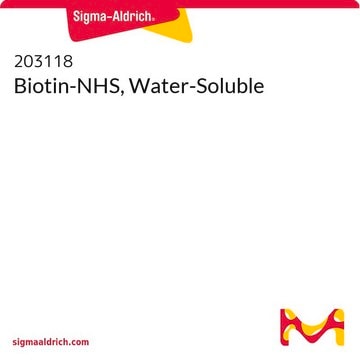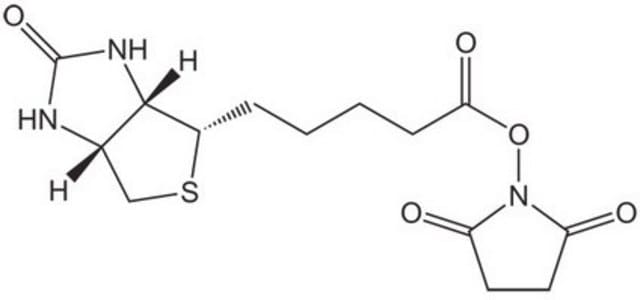H1759
(+)-Biotin N-hydroxysuccinimide ester
≥98% (HPLC), powder
Synonym(s):
(+)-Biotin N-succinimidyl ester, d-Biotin NHS ester, BNHS, Biotinyl-N-hydroxy-succinimide, N-Hydroxysuccinimidobiotin, N-Succinimidyl D-biotinate, NHS-Biotin
About This Item
Recommended Products
Assay
≥98% (HPLC)
form
powder
reaction suitability
reaction type: Biotinylations
color
white to off-white
mp
212 °C
solubility
DMF: ≤50 mg/mL (Stable for at least one month in dry DMF)
DMSO: soluble
storage temp.
−20°C
SMILES string
[H][C@]12CS[C@@H](CCCCC(=O)ON3C(=O)CCC3=O)[C@@]1([H])NC(=O)N2
InChI
1S/C14H19N3O5S/c18-10-5-6-11(19)17(10)22-12(20)4-2-1-3-9-13-8(7-23-9)15-14(21)16-13/h8-9,13H,1-7H2,(H2,15,16,21)/t8-,9-,13-/m0/s1
InChI key
YMXHPSHLTSZXKH-RVBZMBCESA-N
Looking for similar products? Visit Product Comparison Guide
Application
- to biotinylate Hyb 246-4 for surfactant protein D enzyme-linked immunosorbent assay (SP-D ELISA)
- to biotinylate proteins to form preformed complexes
- to label and modify monoclonal anti-microfibrillar-associated protein 4 (MFAP4) (HG-HYB 7-18) to bind to alphaLISA streptavidin-coated donor beads
Biochem/physiol Actions
Disclaimer
related product
Storage Class Code
11 - Combustible Solids
WGK
WGK 3
Flash Point(F)
Not applicable
Flash Point(C)
Not applicable
Personal Protective Equipment
Certificates of Analysis (COA)
Search for Certificates of Analysis (COA) by entering the products Lot/Batch Number. Lot and Batch Numbers can be found on a product’s label following the words ‘Lot’ or ‘Batch’.
Already Own This Product?
Find documentation for the products that you have recently purchased in the Document Library.
Customers Also Viewed
Our team of scientists has experience in all areas of research including Life Science, Material Science, Chemical Synthesis, Chromatography, Analytical and many others.
Contact Technical Service












